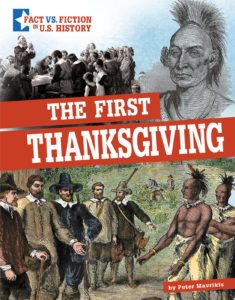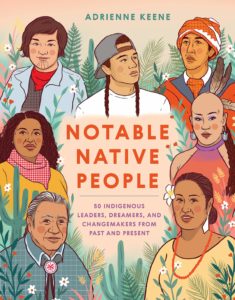“…Thanksgiving is also a reminder of the painful history created by the arrival of European colonizers. For many Native American people, colonization resulted in displacement from their homes, war, disease, and death. Thanksgiving is a day to remember this history and honor the first people of the nation.”
 This sobering message comes to us from a child’s book, The First Thanksgiving: Separating Fact from Fiction, by Peter Mavrikis. New to Smiley Public Library’s Young Readers’ Room collection, it is a non-fiction account in the Fact vs. Fiction in U.S. History series. Though the Pilgrims and indigenous people of the Wampanoag Nation met peacefully at the ‘Thanksgiving’ of 1621, the circumstances surrounding their meeting and the subsequent depictions in American culture are often romanticized. This book is designed for children at sixth-grade level; however, it is full of well-sourced information that we adults may also need to learn, or re-learn.
This sobering message comes to us from a child’s book, The First Thanksgiving: Separating Fact from Fiction, by Peter Mavrikis. New to Smiley Public Library’s Young Readers’ Room collection, it is a non-fiction account in the Fact vs. Fiction in U.S. History series. Though the Pilgrims and indigenous people of the Wampanoag Nation met peacefully at the ‘Thanksgiving’ of 1621, the circumstances surrounding their meeting and the subsequent depictions in American culture are often romanticized. This book is designed for children at sixth-grade level; however, it is full of well-sourced information that we adults may also need to learn, or re-learn.
Native Americans are not the only indigenous peoples who have been displaced by U.S. settler colonization. The American Indigenous community also includes (Hawaiian Kingdom) Kānaka Maoli and Alaskan Native people, in addition to the homelands of 574 federally recognized American Indian tribal nations, and hundreds more state-recognized tribal nations, and others.
 Native author Adrienne Keene reminds us in her recent work, Notable Native People: 50 Indigenous Leaders, Dreamers, and Changemakers from Past and Present, that indigenous peoples are not just part of the historic past, that they are not extinct. They live among us and beside us — their indigenous cultures, thriving, their original languages, alive and well. Keene believes that there is power in sharing stories of Native Americans as a foray into recognizing their centuries-long burden of invisibility and erasure. Our commitment to ‘see’ them will help us admit that we need to interrupt our status quo and take action. Keene does so in an easy-to-read format in which she thoughtfully curates a selection of one-page biographies of 50 indigenous Americans whose accomplishments are sure to impress the reader and, hopefully, inspire us to support the needs of those on whose land we live.
Native author Adrienne Keene reminds us in her recent work, Notable Native People: 50 Indigenous Leaders, Dreamers, and Changemakers from Past and Present, that indigenous peoples are not just part of the historic past, that they are not extinct. They live among us and beside us — their indigenous cultures, thriving, their original languages, alive and well. Keene believes that there is power in sharing stories of Native Americans as a foray into recognizing their centuries-long burden of invisibility and erasure. Our commitment to ‘see’ them will help us admit that we need to interrupt our status quo and take action. Keene does so in an easy-to-read format in which she thoughtfully curates a selection of one-page biographies of 50 indigenous Americans whose accomplishments are sure to impress the reader and, hopefully, inspire us to support the needs of those on whose land we live.
If you enjoy these short bios, you are sure to want to linger over new autobiography Red Paint: The Ancestral Autobiography of a Coast Salish Punk, by newcomer Sasha taqʷšəblu LaPointe, of the Upper Skagit and Nooksack Indian Tribe in the Pacific Northwest. Author, poet, and artist, she guides us through a beautifully-written and enthralling personal memoir in which she attempts to find her indigenous identity, her voice, and the elusive concept of permanence. She writes,
 “I realized I wasn’t sure what permanence looked like, because we weren’t meant to survive. My family, my tribe, my ancestors, we were something temporary to the settlers. Something that would eventually go away. Whether by disease or alcohol or poverty, our genocide was inevitable to them. I looked at the smoke pluming from the metal chimneys of the small reservation houses along the highway. But here we were, existing in our impermanent homes.”
“I realized I wasn’t sure what permanence looked like, because we weren’t meant to survive. My family, my tribe, my ancestors, we were something temporary to the settlers. Something that would eventually go away. Whether by disease or alcohol or poverty, our genocide was inevitable to them. I looked at the smoke pluming from the metal chimneys of the small reservation houses along the highway. But here we were, existing in our impermanent homes.”
LaPointe’s search for this innate, inherited need for a permanent home, urges her to explore the traditional spiritual practices of the women in her lineage, identifying their traumas and her own. She is able to ultimately recognize the through-line of resilience in her Coast Salish ancestors and herself. Her tribe’s healers wear red paint in religious dance ceremonies, and in her exploration of such traditions, combined with her affinity for punk music and poetry, LaPointe finds her own healing and purpose.
For more suggestions for reading and getting to know indigenous peoples, visit our post on Native American Heritage Month on Smiley Blog, https://blog.akspl.org/. You’ll find several new fiction books listed by Native authors, and new non-fiction, like the 2022 update to the classic on Indigenous languages of California, Flutes of Fire. New chapters highlight the exciting efforts of current language activists, and include contemporary writing in several of the languages.
Also listed in the post are older books concerning Native Americans, some set in Southern California, such as a treatise by local historians James Sandos and Larry Burgess on the historical inaccuracies of the novel, Willie Boy & the Last Western Manhunt. You also will be introduced to a new book in the Heritage Room, As they were led : Quakerly steps and missteps toward Native justice, 1795-1940, by Catlin, Martha Claire, which includes in its discussion the Smiley brothers and other Quakers, who, over one hundred years ago, worked toward finding justice for Native Americans.